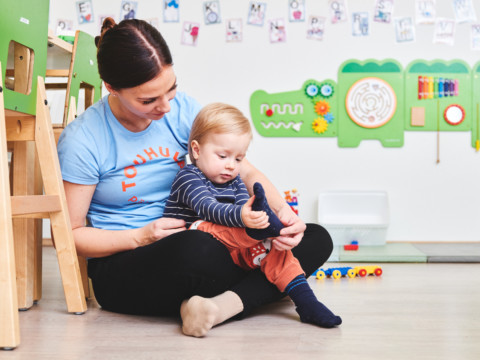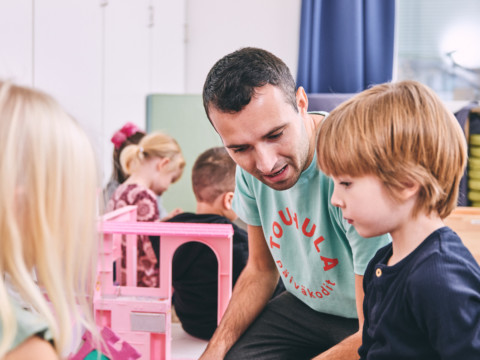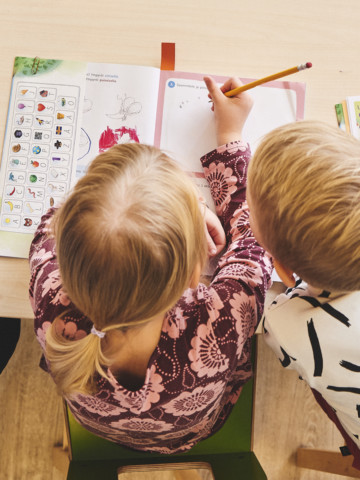Touhula's practices
Touhula’s key principles of early childhood education and care (ECEC) are full-day education and small-group activities. Our focus areas are encounters, interaction and community spirit.
Our educational activities are planned with precision and a long-term approach. All of our daycare centres comply with both the national and municipal early childhood education and care plans (known by the Finnish abbreviation “vasu”). In addition, at Touhula, we apply Touhula Rhythm, a joint pedagogical annual plan that structures the operational year of each daycare centre.
An early childhood education and care plan is drawn up for each child, through cooperation between the child’s family and the daycare centre.
It is the task of the daycare centre to provide each family with overall childrearing support. Open, honest and straightforward cooperation between the family and daycare centre is important.
As part of early childhood education, we engage in multi-sectoral support alongside local actors, such as Special teachers in Early Childhood Education and Care, the child healthcare clinic, municipal daycare centres and schools. The parents are asked for permission for such cooperation in the service contract, and separately in every case.

Small-group activities
In Touhula, children spend most of their day in small groups. We promote the provision of full-day education on the basis of our small-group activities. We divide the children into small groups based on their age, friendships, needs, activities, the premises, and the objectives entered in the early childhood education and care plan. The coordination of activities, the daily rhythm, and the use of premises across the daycare centre are key issues in this respect.
In principle, by ‘small group’ we mean a group of children under the instruction of one adult. However, we examine the composition of each group on a case-by-case basis to ensure that daily activities flow as smoothly as possible.

The children can be divided into activity-based small groups between which the children move, or small fixed groups during instructed activities, for example. As educators, we deploy our specialist expertise to the benefit of all of our groups. This makes us familiar to all of our children, creating a sense of safety and community. In accordance with Touhula’s principles, in small-group activities we take account of the children’s interests and are keen to pursue their initiatives.
Rhythm is intended to provide a framework for planning in each daycare centre.
Touhula Rhythm
Touhula has its own early childhood education and care plan, Touhula Rytmi (Rhythm), which is based on the principles of Finland’s national early childhood education plan and takes account of all areas of learning and broad-based education. Drawn up in accordance with Rhythm, each daycare centre’s annual plan is displayed in the centre, for parents to read.
Each daycare centre uses Rhythm as a basis for planning pedagogical activities suggested by the children, discussed between the children and staff, and planned under the staff’s leadership complement each other. Rhythm highlights the importance of long periods of play for children. Play is valued, and time and space are set aside for it every day.
Pre-primary education – inquisitive minds preparing for school
The purpose of pre-primary education is to foster the children’s basis for growth, development and learning, and to enhance their social skills and healthy self-esteem. At Touhula, pre-primary education is provided in accordance with the national and municipal pre-primary education plan, and Touhula’s own action plan.

The procedures for applying or registering for pre-primary education are specific to each municipality. You can always check the application procedures of your own municipality with the Daycare Manager.
All pre primary education -aged children at Touhula receive certificates of completion at the end of the pre primary education year.
In Touhula daycare centres, the provision of pre-primary education is confirmed during the spring preceding the pre-primary education year. Contact the Daycare Manager for information on the current situation. The contact information of Daycare Managers can be found on the websites of our daycare centres.
See the Finnish National Agency for Education’s website for more information on pre primary education.